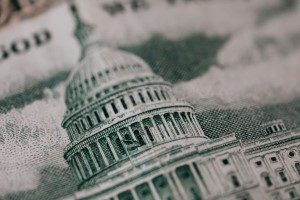Congress Set to Pass NDAA with New Whistleblower Reward Provisions for Money Laundering

The FY21 National Defense Authorization Act (NDAA), likely to be passed by Congress this week, takes a critical step for anti-money laundering (AML) enforcement by creating a long overdue AML whistleblower program. The NDAA’s new whistleblower program, administered by the Department of Treasury, would provide for mandatory awards to whistleblowers who brought forward information about violations of the Bank Secrecy Act (BSA), our primary AML enforcement law.
As our attorneys have argued in a series of op-eds over the past few years, an AML whistleblower program is needed to provide a boost to authorities’ efforts to combat money laundering – the various ways that criminals, terrorists, kleptocrats, and tax evaders clean up their dirty money. The NDAA’s new provisions will effectively limit the use of shell companies by requiring registration of underlying beneficial owner (UBO) information, a change that has rightly received a great deal of attention. But the new whistleblower program is poised to be just as important to AML enforcement.
NDAA Creates an AML Whistleblower Program
If ultimately signed into law, the NDAA, which incorporates the House’s Corporate Transparency Act and the Senate’s Anti-Money Laundering Act of 2020 (AMLA), would create whistleblower protections and incentives to encourage individuals with information about illegal money laundering to come forward. This new program would fill a longstanding gap in our whistleblower award programs.
Specifically, whistleblowers who provided information that leads to monetary sanctions for violations of the BSA would be entitled to an award of up to 30% of the sanctions. So long as the Treasury (through FinCEN) or the Department of Justice recovers more than $1 million in sanctions, an award would be mandatory for a qualifying whistleblower.
Modeled on the tremendously successful SEC Whistleblower Program, this new program could dramatically boost AML enforcement, which struggles with a lack of access to insider information. Indeed, industry analysts believe a whistleblower reward program is so important to enforcement that it was the featured focus of a Financial Times Hackathon project led by Offshore Alert and the Association of Certified Financial Crime Specialists. Along with Constantine Cannon whistleblower lawyers, these AML watchdog organizations proposed model language very similar to that ultimately included in the NDAA.
Key Features of the Proposed AML Whistleblower Program
- The whistleblower must voluntarily provide the information about the BSA violation.
- Whistleblowers do not have to be “insiders.” They may receive awards based on their independent knowledge or independent evaluation of publicly-available information, as long as the government is not already aware of the information.
- Whistleblowers who are insiders may work in compliance at the company they are blowing the whistle on.
- Whistleblowers may supply information anonymously, as long as they are represented by an attorney.
- Whistleblowers are not required to be U.S. citizens or residents. Further, the illegal conduct does not have to have taken place in the United States, as long as the U.S. regulators have jurisdiction.
- Whistleblowers may receive an AML whistleblower award even if their information relates to an existing AML investigation, if they provide additional information that significantly contributes to the success of the existing investigation.
- Employee-whistleblowers may, but do not need to, first report their information through internal compliance procedures.
- Some whistleblowers are entitled to protection from retaliation by their employers based on their reporting of BSA violations.
The international reach of the new program is worth emphasizing. Many international whistleblowers have contacted our London office with information regarding money laundering. With this new program on the horizon, we especially look forward to assisting international whistleblowers in bringing their information forward.
What are the Limits of the NDAA AML Whistleblower Program?
 Despite offering so much promise for the modernization of AML enforcement, the NDAA’s language has several aspects that will likely hinder the success of an otherwise extremely promising – and necessary – new program. Congress should repair these areas as soon as practicable. If it does not, Treasury should swiftly issue interpretive regulations to smooth the rough edges as much as possible.
Despite offering so much promise for the modernization of AML enforcement, the NDAA’s language has several aspects that will likely hinder the success of an otherwise extremely promising – and necessary – new program. Congress should repair these areas as soon as practicable. If it does not, Treasury should swiftly issue interpretive regulations to smooth the rough edges as much as possible.
First, and most critically, the program fails to include a guaranteed minimum award amount. Although an award is theoretically “mandatory” when the criteria are met, the Treasury has the discretion to award a nominal sum, even a dollar. While we hope that Treasury will acknowledge the risks and service of a helpful whistleblower, we know that whistleblowers will be reluctant to come forward when they consider the possibility that they could receive only a minimal amount.
We have learned after decades of experience with other whistleblower reward programs that none are successful unless they offer whistleblowers the certainty of guaranteed minimum awards. For that reason, every major whistleblower program guarantees such awards, such as the SEC (10% minimum); the CFTC (10% minimum); and the IRS (15% minimum). All of these agencies had discretionary whistleblower reward programs that were largely dormant until the agencies implemented guaranteed minimum awards. In each program, almost immediately after that change, whistleblower submissions exploded, resulting in enormous recoveries.
Given the enormous risks faced by whistleblowers, awards must be substantial and certain to incentivize whistleblowing. If this is not fixed, Treasury should clarify through regulation how it will calculate awards under the statutory factors, perhaps by starting with a presumption of a certain percentage, as the SEC has recently done for smaller awards. This could provide needed certainty to nervous whistleblowers.
Second, the anti-retaliation provisions exclude employees of banks regulated by the FDIC from their critical protections. Given the very real risks of retaliation, blowing the whistle can be career suicide. Congress should act to provide the necessary protections to some of those best positioned to bring critical information forward.
Finally, the program excludes certain recoveries from the award base. Specifically, sanctions that are labeled as restitution, forfeiture, or victim compensation are exempt from the award calculation. Although these will not be relevant in every case, they could eviscerate awards in certain circumstances. For example, FinCEN’s $184 million fine of Western Union in 2017 was deemed satisfied by the company’s payment of $586 million in restitution as part of a DOJ resolution. It is possible that Treasury could take the position that therefore no qualifying funds were collected.
We will continue to watch the genesis of this new program, and we hope that Congress and Treasury will take needed steps to make it as strong as it can be.
Read More:
- Legislation Watch: Proposed Amendments to Bank Secrecy Act Include Whistleblower Rewards: Our October, 2019 analysis of the 116th Congress’s H.R. 2514, the “Coordinating Oversight, Upgrading and Innovating Technology, and Examiner Reform Act of 2019” (the COUNTER Act) and S. 2563, the “Improving Laundering Laws and Increasing Comprehensive Information Tracking of Criminal Activity in Shell Holdings Act” (the ILLICIT CASH Act).
- The FinCEN Files Prove We Need an Anti-Money-Laundering Whistleblower Program
- Project Proposes Legislative Action to Protect and Incentivize AML Whistleblowers: Article about Global Legal Hackathon proposal by Constantine Cannon, Offshore Alert, and the Association of Certified Financial Crime Specialists
- Constantine Cannon Attorneys Eric Havian and Michael Ronickher Published on Need for Whistleblowers in Anti-Money Laundering Enforcement
Contact Us
- Arrange a confidential consultation with an experienced whistleblower attorney
- The Constantine Cannon Whistleblower Team
Tagged in: Financial and Investment Fraud, Legislation and Regulation News, Money Laundering,